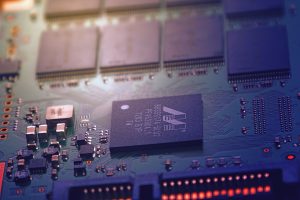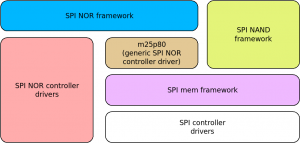
Bootlin is proud to announce that it has contributed SPI NAND support to the U-Boot bootloader, which is part of the recently released U-Boot 2018.11. Thanks to this effort, one can now use SPI NAND memories from U-Boot, a feature that had been missing for a long time.
State of the art: Linux support
A few months ago, Bootlin engineer Boris Brezillon added SPI-NAND support in the Linux kernel, based on an initial contribution from Peter Pan. As Boris explained in a previous blog post, adding SPI NAND support in Linux required adding a new spi-mem layer, that allows SPI NOR and SPI NAND drivers to leverage regular SPI controller drivers, but also to allow those SPI controller drivers to expose optimized operations for flash memory access. The spi-mem layer was added to the SPI subsystem by a first series of patches, while the SPI NAND support itself was added to the MTD subsystem as part of another patch series.

Moving to U-Boot
Since accessing flash memories from the bootloader is often necessary, Bootlin engineer Miquèl Raynal took the challenge of adding SPI NAND support in U-Boot. Miquèl did this by porting the SPI-mem and SPI-NAND subsystems from Linux to U-Boot. The first challenge when porting the SPI-mem and SPI-NAND code from Linux to U-Boot was that the U-Boot MTD stack hadn’t been synchronized with the one of Linux for quite some time. Thus a number of changes in the Linux MTD subsystem had to be ported to U-Boot as well, which was a fairly time-consuming effort. The SPI NAND code has been imported in drivers/mtd/nand/spi, while the spi-mem layer is in drivers/spi/spi-mem.c.
Once the core code was ready, we had to find a way to let the user interact with the SPI NAND devices. Until now, U-Boot had a separate set of commands for each type of flash memory (nand for parallel NAND, erase/cp for parallel NOR, sf for SPI NOR), and it indeed seemed like adding yet another command was the way to go. Instead, we introduced a new mtd that can be used to access all flash memory devices, regardless of their specific type. We will discuss this mtd in more details in another blog post.
However, such a move to a generic mtd command forced us to do a lot more cleanup than expected, as we ended up reworking the MTD partition handling, and even making deep changes in the ubi command. This was more complicated than anticipated because of the SPI NOR support in U-Boot: it is not very well integrated with MTD subsystem, in the sense that there is a duplication of information between the SPI NOR and MTD subsystems, and when the duplicated information is no longer consistent, really bad things happen. As an example, any call to sf probe was doing a reset of the MTD device structure using memset, causing all other state information contained in this structure to be lost. Since the SPI NAND support relies on the MTD subsystem (much more than the current SPI NOR support), we had to mitigate those issues. Long term, a proper rework of the SPI NOR support in U-Boot is definitely needed.
Some of those issues are present in the 2018.11 release and were discovered by U-Boot users who started testing the new mtd command. We have contributed a patch series addressing them, which hopefully should be merged soon.
Now that those difficulties are hopefully behind us, the U-Boot SPI-NAND support looks pretty stable, and we have quite a few SPI-NAND manufacturer drivers in U-Boot mainline, with Gigadevice, Macronix, Micron and Winbond supported so far. We’re happy to have contributed this new significant feature, as it finally allows to use this popular type of flash memory in U-Boot.
